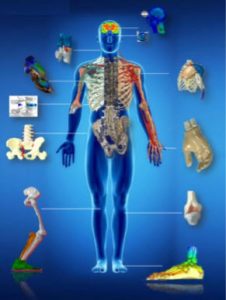This is another blog post in a new series where we talk to SIMULIA employees about current projects they are working on and developments they see in the simulation world. Recently, our Virtual Human Modeling team attended the Biomedical Engineering Society (BMES) conference where Dassault Systèmes was a Gold Sponsor. We talked to April Deady, a Life Sciences Industry Solution Experience Manager at SIMULIA, to find out about our role at the conference. Read more about our exhibitor booth and showcase luncheon seminars in April’s full recap of the conference below.
The Biomedical Engineering Society (BMES) and the US Food and Drug Administration (FDA) partnered to co-sponsor the BMES/FDA Frontiers in Medical Devices Conference: The Role of Digital Evidence to Support Personalized Patient Healthcare, which took place on March 19-21, 2019, at the College Park Marriott Hotel and Conference Center at the University of Maryland, in Washington, DC. The conference provided a forum for participants involved in the development and evaluation of medical devices to meet and share their expertise, establish collaborations, and discuss strategies to effectively utilize computational modeling to support patient care and improve final outcomes. Technical tracks focused on topics related to the increased role of simulation as evidence for healthcare and were chaired by a panel of researchers and modelers from industry, government, and academia. In addition to technical tracks and presentations, top student submissions across tracks were highlighted in a student paper competition.

The Dassault Systemes Showcase Luncheon, “Innovate with Confidence: Put the Human at the Center of Device Design and Development,” highlighted how virtual human models and simulation can help to:
- Obtain a greater understanding of human physiology through multiphysics and multi-scale simulation capabilities
- Accelerate the development and testing of novel, complex medical devices
- Enhance the power of machine learning to generate meaningful data
- Enable a complete transformation of the ability to deliver quality patient experiences
Our booth included a variety of presentations:
- Validation of a computational model of transcatheteraortic valve implantation in bicuspid aortic valve disease – MatthieuDe Beule (FEops)
- Modeling of Fatigue Life of CRM Leads Using Use Conditions Data from Numerical Simulation – Daniel Cooke (Boston Scientific)
- Boundary condition estimation for structural heart devices with a living human heart model – Sakya Tripathy (Edwards)
- Fluid-Structure Interaction Analysis of TAVR Valve Performances in Living Heart Human Model – Ram Ghosh (Stony Brook University)
- Image-based, population-specific, in-silico analysis for mitral valve replacement – BenedettaBiffi (University College London)
- TKA Contact Area Contact Stress FEA Validation following ASME V&V 40 – Xiangyi(Cheryl) Liu (Stryker)
SIMULIA’s own Jiang Yao, Karl D’Souza, and Nuno Rebelo presented their paper, “Predicting Cardiac Function Due to Change in Heart Rate Using the Living Heart Human Model,” which demonstrates that, by adjusting a few physiological based parameters, the Living Heart Human Model (LHHM) can be recalibrated to predict realistic cardiac outputs that match experimental measurements for heart rates ranging from 90-160 beat/min.
We were honored to be a part of this wonderful conference and look forward to the future of personalized medicine and healthcare.
To learn more about the Living Heart Project, visit our dedicated page.
To learn more about Life Sciences, visit our dedicated page.
